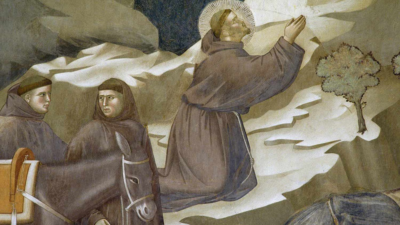Francis and Prayer
St. Francis of Assisi
Prayer was an anchor in Francis’ life – and not just daily prayer and Mass, but there were extended periods of time he and other brothers withdrew to places in the Reiti Valley for days of prayer.

When people think of St. Francis of Assisi and prayer, what most likely comes to mind is “The Peace Prayer of St. Francis,” with the memorable line: “Make me an instrument of peace…” It is a moving and noteworthy prayer, certainly in the Franciscan tradition, perhaps inspired by St. Francis, but it dates to 1912 and was first published as a poem in the French spiritual magazine, La Clochette. Later, during World War I, it appeared on the back of a holy card bearing an image of St. Francis and the association of the two became cemented in our minds.
To read the story of the life of St. Francis is to know without a doubt that he was a man of prayer. One of the earliest stories recounts an extended time of prayer as Francis sought the will of God in his life. Francis had taken to wandering and praying in the wild places – forests, caves, and uninhabited countryside. During his wanderings, Francis came upon the abandoned chapel of San Damiano, just outside the city of Assisi. This became his place of prayer where he discovered a hereto unknown peace. While praying before the altar, he begged God to reveal His will. It is on one of his visits, praying before the cross at San Damiano that “the image of the Christ crucified spoke to him in a tender and kind voice: ‘Francis, don’t you see that my house is being destroyed? Go, then, and rebuild it for me.’” (Legend of the Three Companions, L3C-12) It is from this experience that comes one of the oldest Franciscan prayers. Written in the margin of two very old copies of L3C is this prayer: “Most high glorious God, enlighten the darkness of my heart and give me true Faith, certain Hope, and perfect Charity; give me perception and knowledge, Lord, that I might carry out your holy and true command.” Within the tradition, it is known as St. Francis’ “Prayer before the Crucifix.”
For many, the spontaneity of that prayer seems very much to match the personality one imagines of St. Francis. I think that it is a part of the person that Francis was. But he also wrote some equally inspired and intentional prayers: The Praises of God, The Canticle of the Creatures (also known as Canticle of the Sun), The Office of the Passion, A Prayer Inspired by the Our Father, The Praises for All Hours, A Salutation of the Blessed Virgin, and A Salutation of the Virtues.
The Canticle of the Creatures is a poetic prayer which partly reveals an aspect of Francis’ vision of God, creation, and the human soul. It also shows that Francis was a man of prayer, whose prayer expanded and grew as time and experience shaped him to his divine calling. The first nine verses of the prayer were written late in St. Francis’ time when he suffered greatly from illness and physical infirmities. The verses praise God through His creation: “Praise be to You, my Lord…[seen in] Brother Sun…Sister Moon and the stars…Brother Wind…Sister Water…Brother Fire…Mother Earth.” A while later, after hearing of a quarrel that had broken out between the civil and religious authorities of Assisi, Francis asked that the brothers go before the warring parties and sing the Canticle, but added verses 10 and 11: “Praised be You, my Lord, through those who give pardon for Your Love and bear infirmity and tribulation. Blessed are those who endure in peace for by You, Most High, shall they be crowned.” Francis composed the last two verses on his deathbed: “Praised be You, my Lord, through our Sister Bodily Death…Blessed are those whom death will find in Your most holy will, for the second death shall do them no harm.”
Prayer was his chief comfort. It was Francis’ starting place, his source of strength in faith. God was his refuge on whom he could cast all of his cares and burdens. He was completely dependent on the Lord, and he understood that progress in God’s service was futile without prayer. In fact, he placed prayer at the highest pinnacle of all of the spiritual exercises and used every means to have his friars concentrate on it. He eagerly sought to pray to God without ceasing, to keep his soul always in the presence of God. St. Bonaventure writes: “Prayer was his sure refuge in everything he did; he never relied on his own efforts, but put his trust in God’s loving providence and cast the burden of his cares on him in insistent prayer. He was convinced that the grace of prayer was something a religious should long for above all else. No one, he declared, could make progress in God’s service without it.”
This is behind Francis’ letter to St. Anthony of Padua who had requested permission to teach: “Brother Francis sends greetings to Brother Anthony, my bishop. I am pleased that you teach sacred theology to the brothers, providing that, as is contained in the Rule, you ‘do not extinguish the Spirit of prayer and devotion’ during study of this kind.” (A Letter to Brother Anthony of Padua)
Francis knew that for a true Franciscan or anyone who could call themselves “Christian,” the center of life with God was “the Spirit of prayer and devotion.”